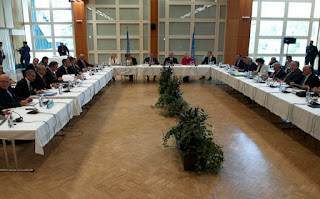The Path toward Collective Action
Crises by definition portend systemic adjustments and instabilities. At the same time, however, they –by and large– provide opportunities, be it structural economic and political changes, domestic reforms and cooperation with other states and non-state actors at the regional and international level. The global economic crisis exemplifies this duality. Also, the crisis is at the same time economic and geopolitical in scope. The current crisis also introduces a time element as its likely duration and span are uncertain.
The economic effects lie beyond this commentary albeit it is safe to say that the relevant economic and social models of choice applied by governments to cope with it impact upon their political instruments and policy choices. This is particularly the case given the pressure and demand for the state authorities to assume a more intervening role in the functioning of the market
The crisis finds the international order in flux having entered into a new era characterised by dramatic changes both in terms of structure and process, thus resulting in the emergence of a precarious new world balance. With the election of Barack Obama in 2008 to the Presidency of the United States, the dismantling of a number of policies of the Bush era, and Russian-American relations somewhere between ‘reset’ (to use Hillary Clinton’s term and ‘reconfiguration’ (in the words of Sergei Karaganov), the prospects for increased constructive cooperation at the international level in order to meet global challenges have significantly improved. Nevertheless, security dilemmas ranging from the perpetual Israeli-Palestinian conflict, the situation in Afghanistan and Iraq, the 2008 terrorist attacks in India combined with the tense relations with Pakistan and the ‘Iranian enigma’, to name a few, persist thereby charging the international (security) agenda.
A number of questions arise in need to redress: Is there a link between the global financial and economic crisis and governance? What is its effect on democracy? What is its effect on the EU? Does the crisis provide for opportunity?
Within the
Nevertheless, the Black Sea Region in 2009 is radically different from what it was two decades ago, both economically and politically. While all the economic indicators over the said period have demonstrated a tremendous rise, indicative to a certain extent of the transformation processes in the former communist space in the post-Cold War period and the advent of globalisation and regionalisation, the changes in relations between the West and Russia have intruded on the political environment with a turn for the worse almost simultaneously with the incursion of the economic crisis. The democracy backlash is particularly relevant. In fact, there is a concern among democracy scholars about the ability of newer and less consolidated democracies to avoid political breakdowns as sharp drops in income and increases in unemployment occur.
The dual nature of the crisis shows how governments have to cope both with the challenges the crisis has posed and to seize the opportunities it has presented in terms of domestic and foreign policy rethinking. Faced with the threat of a democratic backlash in new democracies such as
This implies a number of dilemmas for the
Nevertheless, the myriad of provisos, both real and perceived, that can act as barriers to cooperative action in order to tackle the negative effects of the global crisis should not be an obstacle to joint action. The crisis brings at the forefront the need for coordination among nation states and organizations within the current global financial architecture while it also generates debate on the design of a new global mechanism or structure. The question is how to turn the negative effects of the crisis into an opportunity. In the post-crisis world, will the EU’s
The crisis conceivably provides the opportunity for a new paradigm, a new strategy in the relations between the European Union and the Black Sea Region which accommodates the interests of regional hegemons like
Conditions might actually be ripe for a consensus to emerge given a thaw of sorts between



Comments